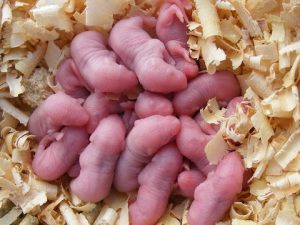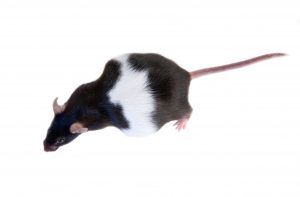

Don’t Forget The Micronutrients For Your Mice During Gestation!
Pregnancy is associated with increased nutritional needs, compounding the demands on the female and fetus. Maternal undernutrition has been associated with a range of adverse outcomes, from low birth weight, congenital abnormalities, and chronic disease to mortality. Proper maternal nutrition is therefore imperative during gestation for proper development of the embryos and healthy gestation.
Undernutrition often refers to insufficient caloric intake, linked to a lack of macronutrients (proteins, fats and carbohydrates). While standard feeds are generally well balanced, the high nutritional demands on the breeding female may require supplementation. Offering fortified dietary supplements like DietGel® Prenatal with 14% protein, 15% fat and 18% carbs, will provide a balanced caloric intake. However, micronutrients are also vital for improving pregnancy outcomes.
Iron & Vitamin A For Pregnant Mice
Vitamin A is a fat-soluble vitamin stored in the liver, and exists in three forms: retinal, retinol and retinoic acid – its most biologically active form being retinoic acid. Adequate maternal status of vitamin A, or Retinoic Acid, is critical for healthy development of the embryos. Vitamin A is known to be critical for eye development, playing multiple roles in that process. However, an unbalanced level of retinoic acid during pregnancy can lead to severe congenital malformations, as vitamin A functions are numerous: it is involved in the development of the heart, vascular and circulatory system and hematopoiesis; the brain, eyes and central nervous system; the skull, skeleton and craniofacial structures, and more broadly acts as a signaling molecule regulating gene expression (1).
During pregnancy, iron is essentially needed to meet the demand of the increase in blood volume and red blood cells to transport oxygen, to assist in the growth of the fetus, placenta, and maternal tissues. Iron–deficiency anemia during pregnancy is associated with adverse effects on fetal development, including growth retardation, neural impairment and even death. Indeed, smaller litters are observed when the females are fed an iron-deficient diet (2).
Vitamin A may facilitate iron absorption and metabolism to prevent anemia and plays a key role in mucosal immune responses. Co-supplementation is thus advised, as it is more effective than supplementation with either micronutrient alone. Make sure to supplement your breeding females with both iron and vitamin A, both included in DietGel® Prenatal, to support pup development and the breeding females’ health during gestation, which will support sustaining high productivity of your colony.
Water soluble Vitamin Bs During Mice Gestation
The entire B complex of eight water soluble vitamins plays an important role during gestation, especially B6 (pyridoxine), B9 (folic acid) and B12 (cobalamin) which have an important role in neurodevelopment. In particular, folate is needed for the closure of the neural tube, and deficiency of folate leads to several congenital malformations, including craniofacial, heart and neural tube defects such as anencephaly or spina bifida (3).
Adequate vitamin B12 status during pregnancy is critical for fetal development, as it is involved in gene expression, cell differentiation and formation of organs. A diet deficient in Vitamin B12 leads to delayed conception and non-productivity, associated with decreased litter size and decreased pups weight leading to high mortality rate (4).
The metabolisms of Vitamins B9 and B12 are interrelated in a key pathway essential for nucleotide synthesis, DNA methylation, and repair. Vitamin B-12 and folate deficiency leads to impaired DNA synthesis and erythropoiesis, causing anemia (5). DietGel® Prenatal contains a broad range of vitamins including 0.85mcg of vitamins B12 and 51.1 mcg of Vitamin B9 for 100g.
Hear what users of DietGel Prenatal have to say:
“The gel is working very well! We had a cage of mice (our last set of surviving breeders) finally produce a litter after 5 months of nothing. The investigator has purchased a case to use in all of the breeding cages.” – Baylor College of Medicine
“We are quite pleased with it and would like to continue using it” – Public Health Agency of Canada
“We have tried it and we ordered a case of the Prenatal for some mice and rats that are poor mothers or don’t breed well. Things seem to be going well.” – University of Colorado
For more information on breeding colony management, download our Best Practices for Rodent Colony Planning, Breeding Support, and Pup Health Guide. To try our products first hand, Request a Sample
References
(1) Role of Vitamin A/Retinoic Acid in Regulation of Embryonic and Adult Hematopoiesis – Canete et al., Nutrients. 2017
(2) Effect of dietary iron on fetal growth in pregnant mice – Hubbard et al., Comp Med.2013
(3) Mice lacking the folic acid-binding protein Folbp1 are defective in early embryonic development – Jorge A. Piedrahitaet al ., 1999 Nature Genetics
(4) Severe but Not Moderate Vitamin B12 Deficiency Impairs Lipid Profile, Induces Adiposity, and Leads to Adverse Gestational Outcome in Female C57BL/6 Mice – Ghosh et al., Frontiers in Nutrition 2016
(5) Vitamin B-12 and Perinatal Health – Finkelstein et al., Advances in Nutrition 2015

